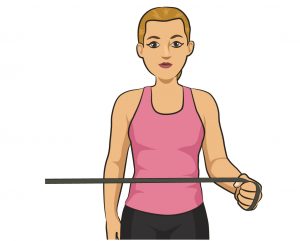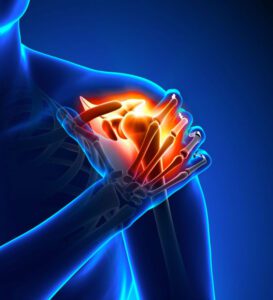Shoulder pain can be a common complaint among individuals of all ages and lifestyles. Whether you’re an athlete, an office worker, or a stay-at-home parent, shoulder pain can significantly impact your daily activities and quality of life. However, it’s essential to understand that pain and damage are not the same thing when it comes to shoulder injuries. In this blog post, we will explore the difference between pain and damage, and why it’s crucial to seek proper diagnosis and treatment for shoulder pain.
What is Shoulder Pain?
Shoulder pain refers to any discomfort or unpleasant sensation experienced in the shoulder area. It can range from mild to severe and may be accompanied by stiffness, weakness, or limited range of motion. Shoulder pain can be caused by various factors, including muscle strains, ligament sprains, tendonitis, bursitis, arthritis, or even referred pain from other areas of the body. Sometimes shoulder pain can come on very quickly (for example sudden strain on your rotator cuff, or a shoulder dislcoation). On other occasions, repetitive use and overload of your shoulder can result in irritability of the structures in your shoulder
Understanding Damage
Damage, on the other hand, refers to structural changes or injuries that occur within the shoulder joint or surrounding tissues. This can include tears in the muscles, tendons, or ligaments, as well as degenerative changes in the bones or cartilage. While damage can cause pain, it’s important to note that not all damage leads to pain, and not all pain indicates significant damage.
Why Pain and Damage Are Not the Same
The human body is a complex system, and pain perception is influenced by various factors, including individual pain thresholds, psychological factors, and the body’s natural healing response. It’s possible to experience significant pain without significant damage, or vice versa. For example, a minor muscle strain may cause intense pain, while a more severe injury may result in minimal pain due to nerve damage or shock. Recent research shows that people who have larger rotator cuff tears do not necessarily have more pain than those with smaller tears. Indeed, your social situation, your mental health and how you are coping with your injury has been shown to influence your pain, more than the level of damage in your shoulder. Talk to a qualified expert shoulder physio to discuss this further.
The Importance of Proper Diagnosis
When it comes to shoulder pain, it’s crucial to seek proper diagnosis from a qualified healthcare professional. They will perform a thorough evaluation, which may include physical examination, imaging tests, and medical history review. By identifying the underlying cause of your pain, they can develop an appropriate treatment plan tailored to your specific needs. Contact Auckland Shoulder Clinic now to book in to see an expert shoulder physio
Treatment Options
Treatment for shoulder pain will depend on the underlying cause and severity of the condition. It may include a combination of conservative measures such as rest, ice, physical therapy, and pain medication. Physical therapy typically will involve some exercises to strengthen or stretch your shoulder. In some cases, more invasive interventions like injections or surgery may be necessary to alleviate pain and restore function.
Prevention and Self-Care
While not all shoulder pain can be prevented, there are steps you can take to reduce the risk of injury. Maintaining good posture, practicing proper lifting techniques, and engaging in regular exercise to strengthen the shoulder muscles can help promote shoulder health and prevent pain. Additionally, self-care measures such as applying heat or ice, practicing relaxation techniques, and avoiding activities that exacerbate pain can provide temporary relief.
Conclusion
Understanding that pain and damage are not the same thing is crucial when it comes to managing shoulder pain. By seeking proper diagnosis and treatment, you can address the underlying cause of your pain and take steps towards recovery. Remember, shoulder pain should never be ignored, and consulting with a healthcare professional is always the best course of action.






